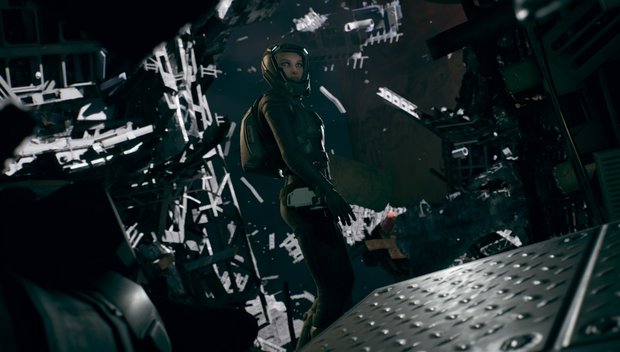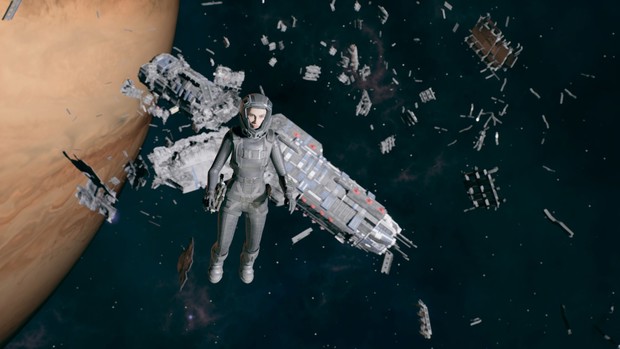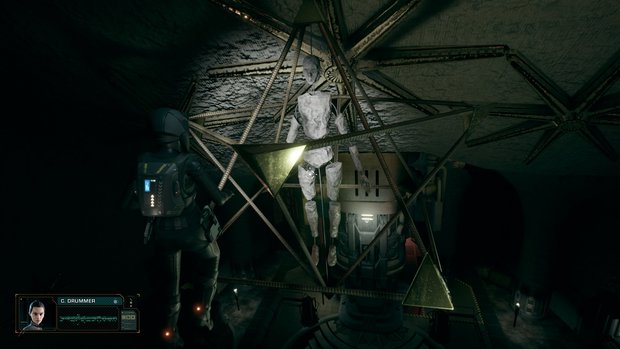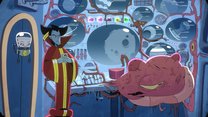The Expanse: A Telltale Series review

- 0 Comments
A small but sturdy first step into sci-fi space, particularly for fans of the show
I’ve always been somewhat ambivalent about The Expanse – the six-season TV show, that is. (I’ve never read any of the novels.) There’s an impressive dedication to the actual science on display, but its fiction often left me feeling cold, in large part due to some loose world-building and unlikeable characters that I could never really get behind. For both better and worse, Telltale and Deck Nine’s five-part interactive prequel shares similar attributes with its predecessor, eliciting more mixed emotions as I played, though they’ve wisely softened its protagonist to be much more sympathetic in the lead role here. They’ve also upped the gameplay quotient over many of Telltale’s recent narrative-driven adventures, which is a welcome development even if it’s largely superficial, because it nicely smooths over the thin, overly familiar premise. Newcomers to the franchise may be left scratching their heads at times, but overall it’s an engaging experience with some pretty crucial decisions to make along the way, which will help fill the void for existing fans eager for another foray into the universe of Earthers, Martians and Belters.
For those new to The Expanse universe, the game does surprisingly little to bring you up to speed, simply dropping you into the action to figure out who’s warring with whom, and why. (Then again, so did the show.) If you’re not familiar with Belter Creole, you’ll just have to muddle through without knowing the difference between “beratna” or “pashang” until you get the hang of it in context. (Fortunately, the slang isn’t overdone.) But all you really need to know is that it’s set in the 24th century, when Earth and Mars (colonizers formerly from Earth, not little green men) are in a state of perpetual cold war, seemingly always on the brink of outright conflict. Trapped in the middle are the fiercely independent Belters, those who swear no allegiance to either planet and are left to fend for their own survival, often suffering the brunt of the hostility between the two “Inners.”
Telltale’s The Expanse includes a smattering of each faction. It’s set before the events of the TV series, so no James Holden or the crew of the Rocinante anywhere to be found (though a few other ancillary characters make welcome cameo appearances). The game follows the exploits of the Artemis, a scavenger ship commanded by Camina Drummer – a character show fans will instantly recognize. Her ragtag team includes Arlen and Rayen, a pair of twin fellow Belters; Virgil, a secretive medic from Luna (the moon); and Khan, a crusty old pilot from Earth, as well as a Martian engineer named Maya, who may or may not be a potential love interest to clink helmets with, depending on your choices. None of them know each other particularly well, and their confined quarters would seem to be a hotbed for potential infighting (something at which Telltale excels), and yet racial discord is kept largely to a minimum. That said, they’re all mercenaries with their own agendas, so dissension is inevitable – and they’re whoppers when they occur.

The main danger here is not interplanetary war but rather a rogue pirate ship that’s wreaking havoc in the Belt. The Artemis crew is just trying to eke out a living by scavenging derelict ships when they discover a tip that could lead to unimaginable riches of unknown origin. This puts them in the crosshairs of the pirates, and it’s only a matter of time before they come face to face – or fist to face, as the case may be. It’s a perfectly serviceable premise that involves plenty of exploration, some shootouts (both ship-to-ship and up close and personal), and even a little conspiratorial intrigue, though it's a fairly small adventure in the grander scheme, and the plot ends up feeling a bit recycled. More like, say, a double-length “to be continued” episode from the show, rather than a full season.
Did I say “exploration” in a Telltale game? Why, yes I did! Pre-downfall Telltale 1.0 had begun streamlining their games so severely that they practically ran on rails aside from the odd confined “look around” scenes. The Expanse shares much more in common with developer Deck Nine’s Life Is Strange games (Before the Storm, True Colors) in giving players a greater degree of freedom to roam. There may still not be a lot to DO, but it’s so much better feeling like you’re driving the action than merely a passenger and occasional contributor to someone else’s story.
While your journey will take you through a few different locations, they do tend to feel a bit samey, consisting of hulking metal structures in varying states of distress. The three-level Artemis has only a handful of rooms to investigate, but you’ll get to venture out to scour an abandoned station-turned-mausoleum inside an asteroid, and the devastated remains of dead ships. The first such wreck is the most impressive, as it’s part of a scattered debris field, and you’ll need to traverse gaps in space to reach different sections torn away from the rest. You can’t help but stop and admire the widespread mechanical carnage with a resplendent giant moon in the background as you hover in zero-gravity.

Far more than most sci-fi, The Expanse TV show took great pride in utilizing real science for conveying how ships and people would move and react in different outer space environments. The game follows suit, at least when cinematically convenient, which means that any setting not equipped with its own gravity simulation requires dealing with weightlessness. Magnetic boots allow you to walk on flat metal surfaces – including walls and ceilings! – while personal thrusters let you propel yourself through the air.
Maneuvering is simple using the same mechanics as you do on the ground, although far more comfortable with a gamepad than the floaty mouse control. It’s remarkable how convincing it feels, and it can become a bit disorienting, but you have the ability to rotate yourself left and right mid-air to regain your bearings. It's not at all natural, though (in a good way), and may take some getting used to; more than once I caught myself angling my head to maintain equilibrium before remembering I could right myself in the environment instead.
Thankfully there’s some actual gameplay to give this free exploration a bit of purpose. It’s still rather slight, with very little in the way of challenge, but compared to other Telltale games it’s a welcome return to increased player involvement. There are of course a few Quick Time Events to increase the intensity of some action set pieces, but they’re infrequent and extremely easy, and forgiving to boot, with one key caveat I’ll come to shortly. On a couple other occasions you’ll need to sneak past patrolling drones. I hesitate to even use the word “stealth” as you simply need to glide around their laser-highlighted field of vision. I died once as I fumbled to find the right footing to land before a drone spotted me, restoring me to a point farther back than I’d have liked. Still, there’s nothing here that even the most action-averse gamer wouldn’t be able to get through.
There's an occasional puzzle to solve as well, although they’re as basic as the physical obstacles. You’ll need to reroute power junctions to access new passages, enter a pattern-based code once you’ve found the correct clue, and talk a distraught member of your team through a crisis (though you can butcher the latter entirely and still carry on). As much as “maze” has become a dirty word, I was hoping for a bit more navigational challenge, but it’s almost impossible to get lost as you’re usually following a fairly defined path of corridors, even when moving vertically. If you ever do get turned around, you can click a button to trigger a marker for your current destination. It’s not necessarily a straight line to get there, but it will prevent you from veering too far off course.

It’s worth detouring at least a little, however, as being a scavenger you’ll also want to be on the lookout for stuff you can collect. Occasionally you’re told of an item to pursue as an optional side quest on behalf of a crewmate, but most are just salvage items acting as collectibles. There are no markers or clues for where they may be, but all hotspots are automatically highlighted when in close enough proximity. There are also photos, data records and the like that offer background insight into the world(s) of The Expanse, but you’ll need to manually open up your ship and mission logs to read some of them, which you’re unlikely to feel inclined to do in the heat of the moment.
This being a Telltale/Deck Nine game, naturally there are character- and plot-defining decisions to make too – some timed, some not. There are a few obviously important ones with literal life-and-death stakes (or least life-and-limb), but in the end-of-episode roundups comparing your decisions with other players, I was shocked to see some alternate outcomes I hadn’t even thought possible. I’d usually prefer to jab sharp objects in my eyes than replay a game, especially so soon after, but I was genuinely intrigued to go back and try for different results. The Expanse is fun enough that I didn’t mind repeating everything in between (it helps that the entire game takes only five or so hours to complete) but my efforts to achieve a better ending for everyone reminded me why I don’t like replaying games.
I won’t spoil anything, but let’s just say that saving as many people as you can involves not just appropriate decision making, but flawlessly finishing key QTEs (not simply succeeding, but making no mistakes) and completing side quests hours and episodes earlier, with no clue at the time that they’d have such monumental unforeseen consequences later on. This feels cheap, like the cinematic equivalent of dead ends, letting you blissfully carry on without knowing you’ve just screwed yourself out of an ideal outcome. The game isn’t shy in alerting you that “so and so will remember that” about relatively trivial things, so where’s the “you’ve just signed so and so’s death warrant, loser!” message when you need one?

There are smaller decisions in between the big ones, but I found these to be less prominent than in earlier Telltale games. Not necessarily in number, but in their relevance to the story. Many relate to Drummer’s relationship with her crew, but there’s a wide discrepancy in how much attention is paid to each. Maya gets about 75% of the focus, and while it’s a rewarding relationship to develop, that leaves only scraps for the rest of the team. Khan has a few memorable moments (if you pursue them), but the twins and the doctor are treated almost as afterthoughts. An implausible tacked-on controversy with Virgil is far too little, too late, while the twins play an enormous role in the story, yet I barely felt I knew either of them by the time the final credits rolled. It’s an uneven distribution that made me wonder if the game’s scope got rolled back from something more ambitious at some point.
Your choices help define what kind of character the protagonist is to a certain extent, but even apart from my input I was surprised to find a kinder, gentler Drummer than I knew from the TV show. Of course, those are relative terms for a complex woman who could generously be described as “prickly” even on her best days. But here she seems almost jokey at times, and genuinely concerned about people’s feelings, which is strange – sort of like seeing Mr. Spock smile. Mind you, being the softie that I am, I generally roleplayed her that way whenever I was given the opportunity, but making her more of a badass upon replay mainly just left her remorseful afterward. I wondered if perhaps the game was laying the groundwork for the more hardened, calculating Drummer to follow, and she certainly goes (or may go) through some emotional gut-punch moments, both during current events and in wrestling with the demons of her past, but she still ended up feeling like a much more humane (uhhh, Beltane?) person than her television counterpart. And I think that was a wise choice. I often struggled to like Drummer in the show, and came to really care for her here.
Reprising her role from the show, Cara Gee once again huskily voices Drummer to perfection, and the rest of the cast does an excellent job of backing her up. The one notable exception is Khan, a crass, amusingly cantankerous character given a fine acting performance that instantly endeared her to me, but clearly delivered by a younger actor pretending to be much older than she really is. Sound effects are solid, if seemingly AWOL on occasion, and musically the game is sparse. There’s a grim sci-fi-ish tonal ambience playing in the background to help set the mood, but it’s so subtle I hardly noticed it was there until the more rousing percussive pieces kicked in when the action heated up. There’s a nice musical moment involving a song by Beverley Staunton, but that’s best left to discover (or not) for yourself.
When you’re away on missions, you can communicate with your crew back on the Artemis, but only at predetermined times with predetermined people, which ended up making a bad situation even worse. Instead of being able to converse freely whenever and with whomever you want, you can only call someone when faced with certain hotspots. The problem is, while you can walk around as someone is talking, you can’t interact with the environment until they’re done, which gets old fast when you're standing in front of something awaiting your attention. It gets even more annoying when others contact you unbidden, forcing you to simply stand there and wait if there’s something to do, since there’s no way to advance the dialogue faster, even during replays. I get that they’re conversations the developers want us to hear, but there had to have been a more elegant solution.
Visually The Expanse looks good without ever particularly dazzling, at least outside of those impressive space jaunts. Given the confined nature of the game’s locations, many of them illuminated primarily by flashlight, the palette favours a lot of greys, blacks, greens and blues, but it never feels too dark or murky. Gone is the more stylized graphic novel look from some previous Telltale games in favour of a more realistic depiction, but not so realistic that you’ll start hurling when stumbling across disembodied heads (or headless bodies still artificially rooted to the ground). No one will be confusing it with an AAA production, but the characters look lifelike enough, the lip sync is good, and the animation smooth – in other words, pretty much exactly what you’d expect of these studios.
Final Verdict
For all my laments about what The Expanse might have been, I really did enjoy it for the most part – at least the first time through. Yes, we’ve been there and done it all before, the story and gameplay are both fairly superficial, player choice is more restricted than it might appear, and some rough mechanical issues prevent the experience from being as smooth as it should. But it’s a solid audiovisual production, a more compassionate Camina Drummer proves to be a great character to follow, crucial decisions can lead to genuinely dramatic moments of impactful repercussions, and how can you not have fun flitting around in the weightlessness of outer space? I hope Telltale continues the shift back to games with actual gaming involved, and to that end The Expanse is a good first step in the right direction, with an entire galaxy of stories to tell should they revisit the franchise in future.
Hot take
Like an interactive multi-episode spinoff of the TV show, The Expanse leaves room for improvement but offers a solid sci-fi experience in which time seems to fly by.
Pros
- Camina Drummer (voiced by TV actor Cara Gee) a good fit as protagonist
- Fun to zip or wall-walk around in zero-G
- More gameplay than Telltale’s usual fare
- A few very crucial choices to make
Cons
- Certain crew members underutilized
- Still no real challenge to round out increased interaction
- Backstory and world-building feel carelessly tacked on
Jack played his own copy of The Expanse on PC.










0 Comments
Want to join the discussion? Leave a comment as guest, sign in or register in our forums.
Leave a comment